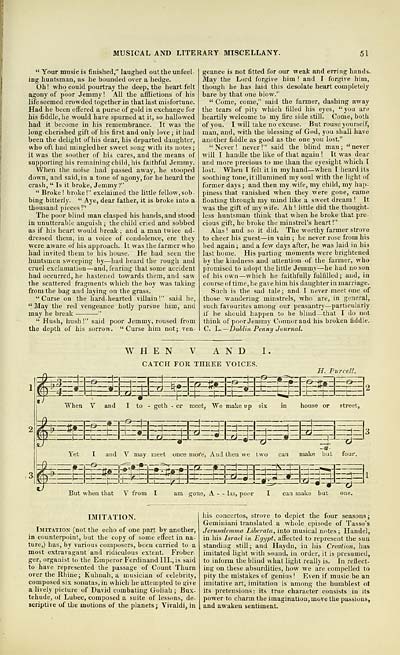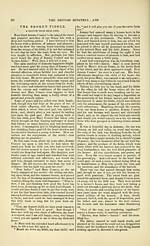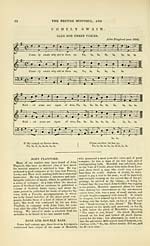Glen Collection of printed music > Printed music > British minstrel, and musical and literary miscellany
(389) Page 51 - When V and I
Download files
Complete book:
Individual page:
Thumbnail gallery: Grid view | List view

MUSICAL AND LITERARY MISCELLANY.
51
" Your music is 6iiished," laughed out the unfeel-
ing huntsman, as he bounded over a hedge.
Oh ! who could pourtray the deep, the heart-felt
agony of poor Jemmy ! All the afflictions of his
life seemed crowded together in that last misfortune.
Had he been offered a purse of gold in exchange for
his iiddle,he would have spurned at it, so hallowed
had it become in his remembrance. It was the
longcherished gift of his first and only love ; it had
been the delight of his dear, his departed daughter,
who oft had mingledher sweet song with its notes;
it was the soother of his cares, and the means of
supporting his remaining child, his faithful Jemmy.
VVhen the noise had passed away, he stooped
down, and said,in a tone of agony, for he heard the
crash, " Is it broke. Jemmy ?"
" Broke! broke!" exclaimed the little fellow, sob-
bing bitterly. " Aye, dear father, it is broke into a
thousand pieces !"
The poor blind man clasped his hands, and stood
in unutterable anguish ; the child cried and sobbed
as if his heart would break ; and a man twice ad-
dressed them, in a voice of condolence, ere they
were aware of his approach. It was the farmer who
had invited them lo his house. He had seen the
huntsmen sweeping by — had heard the rough and
cruel exclamation — and, fearing that some accident
had occurred, he hastened towards them, and saw
the scattered fragments which the boy was taking
from the bag and laying on the grass.
"Curse on the hard-hearted villain!" said he,
" May the red vengeance hotly pursue him, and
may he break "
" Hush, hush !" said poor Jemmy, roused from
the depth of his sorrow. "Curse him not; ven-
geance is not fitted for our weak and erring hands.
May the Lord forgive him I and I forgive him,
though he has laid this desolate heart completely
bare by that one blow."
" Come, come," said the farmer, dashing away
the tears of pity which filled his eyes, "you are
heartily welcome to my fire side still. Come, both
of you. I will take no excuse. But rouse yourself,
man, and, with the blessing of God, you shall have
another fiddle as good as the one you lost."
"Never! never!" said the blind man; "never
will I handle the like of that again ! It was dear
and more precious to me than the eyesight which I
lost. When I felt it in my hand— when I heard its
soothing tone, it illumined my soul with the light of
former days ; and then my wife, my child, my hap-
piness that vanished when they were gone, came
floating through my mind like a sweet dream ! It
was the gift of my wife. Ah ! little did the thought-
less huntsman think that when he broke that pre-
cious gift, he broke the minstrel's heart !"
Alas ! and so it did. The worthy farmer strove
to cheer his guest — in vain ; he never rose from his
bed again ; and a few days after, he was laid in his
last home. His parting moments were brightened
by the kindness and attention of the farmer, who
promised to adopt the little Jemmy — he had no son
of his own— which he faithfully fulfilled; and, in
course of time, he gave him his daughter in marriage.
Such is the sad tale ; and I never meet one of
those wandering minstrels, who are, in general,
such favourites among our peasantry — particularly
if lie should happen to be blind — that I do not
think of poor Jemmy Connorand his broken fiddle.
C. L. — Dublin Penny Journal.
WHEN V AND I.
CATCH FOK THREE VOICES.
P=l:
=^:
-e-
H. Purcell.
1^^
-e-
-^z
SJ
rziz
=|^zfzrj*^
It
±
:f=p=h:^:#f
:tii=l-t==t=:
— l~'-i
When V and I to - geth - er meet, We make up six in house or street,
1j:=ff|Ezt^
XI
-e-
:22:
:i!=:qr
zi=:W:
z^=i:
m
:^=
z^z
Z\~{3
"4 "^
Yet I and V may meet once moi'e, And then we two can make but foar.
-t^-.
ite
ffxtJtf:
tzitrfmztzztdiJ-
|i=zd=i=lri;it:*
§
IzMi
:j=i|^:
But when that V from I ara gone, A - - las, poor
can make but one.
IMITATION.
Imitation (not the echo of one part by another,
in counterpoint, but the copy of some eft'ect in na-
ture,) has, by various composers, been carried to a
most extravagant and ridiculous extent. Frober-
ger, organist to the Emperor Ferdinand III., is said
to have represented the passage of Count Thurn
over the Rhine; Kuhnah, a musician of celebrity,
composed six sonatas, in which he attempted to give
a lively picture of David combating Goliah ; Bux-
tehude, of Lubec, composed a suite of lessons, de-
scriptive of the motions of the planets ; Vivaldi, in
his concertos, strove to depict the four seasons ;
Geminiani translated a whole episode of Tasso's
Jentsalemma Liberata, into musical notes ; Handel,
in his Israel in Egypt, affected to represent the suu
standing still; and Haydn, in his Creation, has
imitated light with sound, in order, it is presumed,
to inform the blind what light really is. In reflect-
ing on these absurdities, how we are compelled to
pity the mistakes of genius ! Even if music be an
imitative art, imitation is among the humblest ot
its pretensions: its true character consists in its
power to charm the imagination, move the passions,
and awaken sentiment.
51
" Your music is 6iiished," laughed out the unfeel-
ing huntsman, as he bounded over a hedge.
Oh ! who could pourtray the deep, the heart-felt
agony of poor Jemmy ! All the afflictions of his
life seemed crowded together in that last misfortune.
Had he been offered a purse of gold in exchange for
his iiddle,he would have spurned at it, so hallowed
had it become in his remembrance. It was the
longcherished gift of his first and only love ; it had
been the delight of his dear, his departed daughter,
who oft had mingledher sweet song with its notes;
it was the soother of his cares, and the means of
supporting his remaining child, his faithful Jemmy.
VVhen the noise had passed away, he stooped
down, and said,in a tone of agony, for he heard the
crash, " Is it broke. Jemmy ?"
" Broke! broke!" exclaimed the little fellow, sob-
bing bitterly. " Aye, dear father, it is broke into a
thousand pieces !"
The poor blind man clasped his hands, and stood
in unutterable anguish ; the child cried and sobbed
as if his heart would break ; and a man twice ad-
dressed them, in a voice of condolence, ere they
were aware of his approach. It was the farmer who
had invited them lo his house. He had seen the
huntsmen sweeping by — had heard the rough and
cruel exclamation — and, fearing that some accident
had occurred, he hastened towards them, and saw
the scattered fragments which the boy was taking
from the bag and laying on the grass.
"Curse on the hard-hearted villain!" said he,
" May the red vengeance hotly pursue him, and
may he break "
" Hush, hush !" said poor Jemmy, roused from
the depth of his sorrow. "Curse him not; ven-
geance is not fitted for our weak and erring hands.
May the Lord forgive him I and I forgive him,
though he has laid this desolate heart completely
bare by that one blow."
" Come, come," said the farmer, dashing away
the tears of pity which filled his eyes, "you are
heartily welcome to my fire side still. Come, both
of you. I will take no excuse. But rouse yourself,
man, and, with the blessing of God, you shall have
another fiddle as good as the one you lost."
"Never! never!" said the blind man; "never
will I handle the like of that again ! It was dear
and more precious to me than the eyesight which I
lost. When I felt it in my hand— when I heard its
soothing tone, it illumined my soul with the light of
former days ; and then my wife, my child, my hap-
piness that vanished when they were gone, came
floating through my mind like a sweet dream ! It
was the gift of my wife. Ah ! little did the thought-
less huntsman think that when he broke that pre-
cious gift, he broke the minstrel's heart !"
Alas ! and so it did. The worthy farmer strove
to cheer his guest — in vain ; he never rose from his
bed again ; and a few days after, he was laid in his
last home. His parting moments were brightened
by the kindness and attention of the farmer, who
promised to adopt the little Jemmy — he had no son
of his own— which he faithfully fulfilled; and, in
course of time, he gave him his daughter in marriage.
Such is the sad tale ; and I never meet one of
those wandering minstrels, who are, in general,
such favourites among our peasantry — particularly
if lie should happen to be blind — that I do not
think of poor Jemmy Connorand his broken fiddle.
C. L. — Dublin Penny Journal.
WHEN V AND I.
CATCH FOK THREE VOICES.
P=l:
=^:
-e-
H. Purcell.
1^^
-e-
-^z
SJ
rziz
=|^zfzrj*^
It
±
:f=p=h:^:#f
:tii=l-t==t=:
— l~'-i
When V and I to - geth - er meet, We make up six in house or street,
1j:=ff|Ezt^
XI
-e-
:22:
:i!=:qr
zi=:W:
z^=i:
m
:^=
z^z
Z\~{3
"4 "^
Yet I and V may meet once moi'e, And then we two can make but foar.
-t^-.
ite
ffxtJtf:
tzitrfmztzztdiJ-
|i=zd=i=lri;it:*
§
IzMi
:j=i|^:
But when that V from I ara gone, A - - las, poor
can make but one.
IMITATION.
Imitation (not the echo of one part by another,
in counterpoint, but the copy of some eft'ect in na-
ture,) has, by various composers, been carried to a
most extravagant and ridiculous extent. Frober-
ger, organist to the Emperor Ferdinand III., is said
to have represented the passage of Count Thurn
over the Rhine; Kuhnah, a musician of celebrity,
composed six sonatas, in which he attempted to give
a lively picture of David combating Goliah ; Bux-
tehude, of Lubec, composed a suite of lessons, de-
scriptive of the motions of the planets ; Vivaldi, in
his concertos, strove to depict the four seasons ;
Geminiani translated a whole episode of Tasso's
Jentsalemma Liberata, into musical notes ; Handel,
in his Israel in Egypt, affected to represent the suu
standing still; and Haydn, in his Creation, has
imitated light with sound, in order, it is presumed,
to inform the blind what light really is. In reflect-
ing on these absurdities, how we are compelled to
pity the mistakes of genius ! Even if music be an
imitative art, imitation is among the humblest ot
its pretensions: its true character consists in its
power to charm the imagination, move the passions,
and awaken sentiment.
Set display mode to: Large image | Transcription
Images and transcriptions on this page, including medium image downloads, may be used under the Creative Commons Attribution 4.0 International Licence unless otherwise stated. ![]()
| Special collections of printed music > Glen Collection of printed music > Printed music > British minstrel, and musical and literary miscellany > (389) Page 51 - When V and I |
|---|
| Permanent URL | https://digital.nls.uk/91439613 |
|---|
| Description | Scottish songs and music of the 18th and early 19th centuries, including music for the Highland bagpipe. These are selected items from the collection of John Glen (1833 to 1904). Also includes a few manuscripts, some treatises, and other books on the subject. |
|---|
| Description | The Glen Collection and the Inglis Collection represent mainly 18th and 19th century Scottish music, including Scottish songs. The collections of Berlioz and Verdi collected by bibliographer Cecil Hopkinson contain contemporary and later editions of the works of the two composers Berlioz and Verdi. |
|---|

